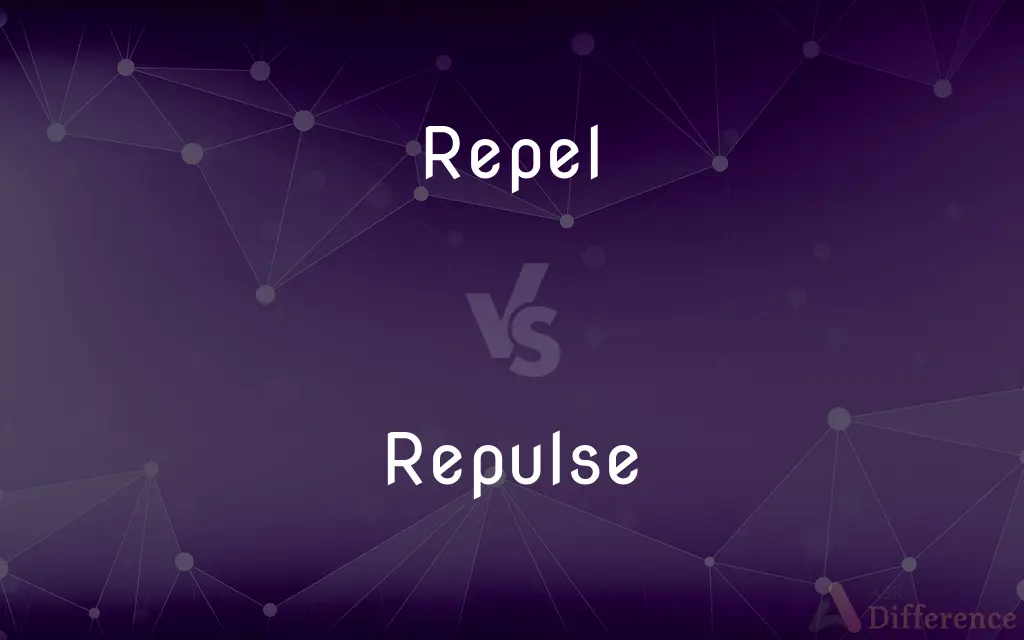Repel vs. Repulse — What's the Difference?
By Maham Liaqat & Urooj Arif — Updated on March 29, 2024
Repel involves driving or warding off, especially in a physical sense, while repulse can denote a strong feeling of disgust in addition to rejection.

Difference Between Repel and Repulse
Table of Contents
ADVERTISEMENT
Key Differences
Repel often refers to the act of driving something away or resisting an attack, whether through physical means, such as a magnetic force, or through protective measures. On the other hand, repulse can carry a similar meaning in terms of rejecting or warding off, but it uniquely encompasses a strong emotional response of disgust or strong aversion, often used in contexts relating to personal feelings or social interactions.
While repel can be used in various contexts, including scientific (e.g., water-repelling surfaces) and military (e.g., repel an invasion), repulse is more frequently used in personal or social contexts, emphasizing emotional reactions. Whereas repel might describe a material's ability to not absorb water, repulse would more likely describe someone's reaction to a distasteful proposal.
In terms of usage, repel can apply to both physical and metaphorical barriers, such as repelling insects with repellent or repelling an idea. In contrast, repulse, though it can be used similarly to repel in the context of rejection, is particularly strong when expressing emotional or moral disgust.
The nature of the action also differs; repel implies an ongoing effort or capability to keep something at bay, suggesting a form of resilience or defense. Repulse, however, suggests a more immediate and often visceral reaction to something deemed highly undesirable or offensive.
In physical sciences, repel is a term often associated with forces, such as magnetic or electric fields, where like forces repel each other. Repulse, however, is rarely used in such contexts, its application being largely confined to human emotions and social interactions.
ADVERTISEMENT
Comparison Chart
Definition
To drive or force back; to resist effectively.
To cause a feeling of disgust or aversion; to reject strongly.
Contexts of Use
Scientific, military, personal defense.
Emotional reaction, personal or social rejection.
Emotional Connotation
Neutral or physical.
Strongly negative, often relating to disgust.
Example Usage
"This jacket is designed to repel water."
"His rude behavior repulsed her."
Physical vs Emotional
Often physical or strategic.
Primarily emotional, can also imply physical rejection.
Compare with Definitions
Repel
Be resistant to something.
The material repels moisture effectively.
Repulse
Cause someone to feel intense disgust.
The sight of the injury repulsed him.
Repel
Cause dislike or distaste.
His arrogance repels many people.
Repulse
Drive back an attack or attacker.
The troops were able to repulse the enemy.
Repel
Drive or force something back or away.
The fortress was built to repel invaders.
Repulse
Reflecting a strong reaction of disgust or rejection.
The proposal was repulsed by the committee due to its unethical nature.
Repel
Resist absorption or influence.
This fabric is treated to repel stains.
Repulse
Cause a feeling of repugnance or aversion.
His manners repulse most of his colleagues.
Repel
Refuse to accept or be associated with.
She repelled the idea of working late.
Repulse
Reject someone or something in a sharp or disdainful way.
She repulsed his advances without hesitation.
Repel
Repel is a commune in the Vosges department in Grand Est in northeastern France.
Repulse
To drive back; repel
Repulsed the attacking forces.
Repel
To ward off or keep away; drive back
Repel insects.
Repulse
To rebuff or reject with rudeness, coldness, or denial.
Repel
To offer resistance to; fight against
Repel an invasion.
Repulse
Usage Problem To cause repugnance or distaste in
Was repulsed by his drunken behavior.
Repel
To refuse to accept or submit to; reject
A company that was trying to repel a hostile takeover.
Repulse
The act of repulsing or the state of being repulsed
The repulse of an attack.
Repel
To refuse to accept (someone); spurn.
Repulse
Rejection; refusal
A repulse of a would-be lover's advances.
Repel
To cause aversion or distaste in
Your rudeness repels everyone. See Usage Note at repulse.
Repulse
(transitive) To repel or drive back.
To repulse an assault; to repulse the enemy
Repel
To be resistant to; be incapable of absorbing or mixing with
Oil repels water.
Repulse
(transitive) To reject or rebuff.
To repulse a suitor
Repel
(Physics) To present an opposing force to; push back or away from by a force
Electric charges of the same sign repel one another.
Repulse
(transitive) To cause revulsion in.
The smell of rotting food repulsed me.
I find your conduct reprehensible, disgusting, and it repulses me, the way a mongoose repulses a snake.
Repel
To offer a resistant force to something.
Repulse
The act of repulsing or the state of being repulsed
Repel
To cause aversion or distaste
Behavior that repels.
Repulse
Refusal, rejection or repulsion
Repel
To turn (someone) away from a privilege, right, job, etc.
Repulse
To repel; to beat or drive back; as, to repulse an assault; to repulse the enemy.
Complete to have discovered and repulsedWhatever wiles of foe or seeming friend.
Repel
(transitive) To reject, put off (a request, demand etc.).
Repulse
To repel by discourtesy, coldness, or denial; to reject; to send away; as, to repulse a suitor or a proffer.
Repel
(transitive) To ward off (a malignant influence, attack etc.).
Repulse
The act of repelling or driving back; also, the state of being repelled or driven back.
By fate repelled, and with repulses tired.
He received in the repulse of Tarquin seven hurts in the body.
Repel
(transitive) To drive back (an assailant, advancing force etc.).
Repulse
Figuratively: Refusal; denial; rejection; failure.
Repel
To force away by means of a repulsive force.
Repulse
An instance of driving away or warding off
Repel
(transitive) To cause repulsion or dislike in; to disgust.
Repulse
Force or drive back;
Repel the attacker
Fight off the onslaught
Rebuff the attack
Repel
To save (a shot).
Repulse
Be repellent to; cause aversion in
Repel
To drive back; to force to return; to check the advance of; to repulse as, to repel an enemy or an assailant.
Hippomedon repelled the hostile tide.
They repelled each other strongly, and yet attracted each other strongly.
Repulse
Cause to move back by force or influence;
Repel the enemy
Push back the urge to smoke
Beat back the invaders
Repel
To resist or oppose effectually; as, to repel an assault, an encroachment, or an argument.
[He] gently repelled their entreaties.
Repel
To act with force in opposition to force impressed; to exercise repulsion.
Repel
Cause to move back by force or influence;
Repel the enemy
Push back the urge to smoke
Beat back the invaders
Repel
Be repellent to; cause aversion in
Repel
Force or drive back;
Repel the attacker
Fight off the onslaught
Rebuff the attack
Repel
Reject outright and bluntly;
She snubbed his proposal
Repel
Fill with distaste;
This spoilt food disgusts me
Common Curiosities
Can repel be used in emotional contexts?
Yes, repel can be used in emotional contexts to indicate causing distaste or aversion, though it is more commonly associated with physical or practical resistance.
Can objects repulse?
Yes, objects can repulse if they cause a strong feeling of disgust or aversion in someone.
What does it mean to repel something?
To repel something means to drive it away or resist its influence or approach.
What does it mean when someone is repulsed by something?
When someone is repulsed by something, they feel a strong sense of disgust or aversion towards it.
Can repellents repulse?
Repellents are designed to repel, but their effectiveness or the aversion they cause to pests can metaphorically be described as repulsing those pests.
How do magnetic fields demonstrate repulsion?
Magnetic fields demonstrate repulsion when like poles (either both north or both south) are brought close together, pushing away from each other.
Is it possible to repulse someone unintentionally?
Yes, it's possible to repulse someone unintentionally through actions or behaviors that the other person finds disgusting or highly objectionable.
Is repulse always negative?
Yes, repulse carries a negative connotation, especially relating to emotional disgust or strong rejection.
How do personal preferences influence repulsion?
Personal preferences, including individual values and experiences, significantly influence what one may find repulsive.
Can repelling someone lead to repulsion?
Repelling someone through certain actions or attitudes can lead to feelings of repulsion, especially if those actions are deemed morally or socially unacceptable.
What makes repulse different from repel?
Repulse specifically implies causing a strong feeling of disgust or aversion, often used in personal or emotional contexts, while repel has broader applications including physical resistance.
Are repel and repulse interchangeable in usage?
While they can sometimes be used interchangeably, especially in the context of rejection, repulse more strongly conveys the element of disgust.
How do companies use the concept of repelling in marketing?
Companies use the concept of repelling in marketing products designed to ward off unwanted elements, like water-repellent clothing or insect repellents, focusing on the protective benefits.
Can repel refer to rejecting ideas?
Yes, repel can refer to rejecting ideas or proposals, especially if they are unappealing or objectionable.
How do societal norms impact what is considered repulsive?
Societal norms play a significant role in defining what is considered repulsive, as cultural standards and values vary widely.
Share Your Discovery

Previous Comparison
Fatal vs. Fateful
Next Comparison
Fief vs. SerfAuthor Spotlight
Written by
Maham LiaqatCo-written by
Urooj ArifUrooj is a skilled content writer at Ask Difference, known for her exceptional ability to simplify complex topics into engaging and informative content. With a passion for research and a flair for clear, concise writing, she consistently delivers articles that resonate with our diverse audience.
















































